Project Introduction
Renegade is a blockchain-based dark pool trading platform. Unlike other non-custodial decentralized exchanges, Renegade maintains complete anonymity throughout the entire trading process. It achieves peer-to-peer order matching through secure multi-party computation and settles transactions atomically using zero-knowledge proofs (mainly referring to completing all operations and steps of a transaction at once, without any intermediate state). This design aims to prevent front-running, sandwich attacks, and copycat trading to avoid price manipulation in DeFi.
Author
Elma Ruan, a senior investment researcher at WJB, holds dual master's degrees in market/finance from Ivy League schools and has 5 years of experience in WEB3, specializing in DeFi, NFT, and other fields. Before entering the crypto industry, she worked as an investment manager at a large securities company.
1. Research Highlights
1.1 Core Investment Logic
The project aims to establish a dark pool exchange primarily serving whales and large holders for high-net-worth individuals and institutional large-scale transactions. Users can view it as a private exchange designed to protect their privacy. These users do not want others to know the flow of their funds or be tracked by other traders in their trading activities. Approximately 30-40% of trades in the traditional US stock market are conducted in dark pools. The project's goal is to prevent unfair practices such as front-running or sniping trades and to maintain market fairness by protecting users' interests. High-frequency trading companies typically use special order types, hardware/software superior to large institutions/banks, to front-run trades ahead of other traders and then sell them to large institutional traders for profit. By establishing a dark pool exchange, the project provides a more private and secure trading environment, allowing users to better protect the confidentiality of their trading activities.
Unlike traditional dark pools, this project is an on-chain exchange and employs Commit-Reveal Schemes, MPC (multi-party computation), and ZK-SNARK technology to hide order transactions to achieve privacy protection. The project team is also technical experts, and with the continuous development of ZK-SNARK technology, Vitalik believes that ZK-SNARK will be as important as blockchain technology in the next 10-20 years. The project has a strong grasp of privacy and fund security and is highly anticipated by many, hoping that this technology can truly be applied in practice.
Another feature of the Renegade exchange is the absence of on-chain oracles, with prices determined by various full nodes and directly transmitted from the APIs of some centralized exchanges (such as Binance, Coinbase, Uniswap). Renegade avoids the presence of market makers by directly matching buyers and sellers, thereby avoiding price manipulation or slippage issues.
However, it is important to note that the essence of blockchain is to build a publicly transparent ledger. When transactions are hidden, on-chain transactions lose their meaning and may attract the attention of privacy regulatory authorities. This may involve compliance issues such as money laundering, thereby limiting the project's development.
In addition, dark pool exchanges have been in existence for some time, but after experiencing bull and bear markets, many projects have almost disappeared or been unable to continue developing. Therefore, the re-emerging track must have corresponding strength to stand firm, otherwise it will only repeat the mistakes of projects like BlackOcean. In addition to the dark pool track, the data track is also receiving increasing attention, such as data privacy projects like Arkham. This will bring technical pressure to the project, as they not only face competition from peers but also face data tracking from other on-chain projects.
In summary, the development of the Renegade exchange is influenced by many factors, including market liquidity, technology, compliance, and competitive pressure. Although the project has not yet launched on the public testnet, making it difficult to effectively assess its trading smoothness and whether it meets user expectations, it aligns with the industry's major trend of high-net-worth individuals holding the majority of funds in the market, with a high demand for privacy. If the project can attract a sufficient user base, it will be able to aggregate the majority of funds in the market and achieve better development. However, since the project has not yet launched, there are still investment risks, and it is advisable to observe cautiously for a period of time and consider it as a medium-term investment project.
1.2 Valuation
Currently, the project has not yet launched on the public testnet, and there is no specific token economic model and reference for the track target, so it is temporarily impossible to evaluate the project.
2. Project Overview
2.1 Past Development and Roadmap
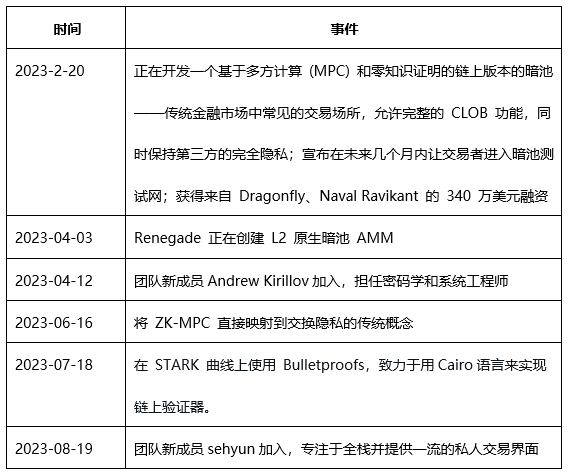
Roadmap:
The original plan was to launch the public testnet in the second quarter of 2023, but it has now entered the third quarter, and the progress of the launch has been delayed. On DISCORD, founder Chris stated that the core network has been successfully established and is undergoing a lot of optimization work. In the initial stage, Renegade is expected to have a response time of less than 3 seconds for placing orders and less than 750 milliseconds for order matching after the launch. Renegade is committed to launching the public testnet as soon as possible to provide a more efficient trading experience.

2.2 Team Overview
2.2.1 Overall Situation
According to linkedin.com, Renegade has 8 members covering fields such as electrical engineering, computer science, and business administration. Team members are proficient in Python, JavaScript, PyTorch, AWS, product development, artificial intelligence, etc. In addition, the project is actively recruiting system/cryptography engineers, interface designers, and technical personnel on its official Twitter.
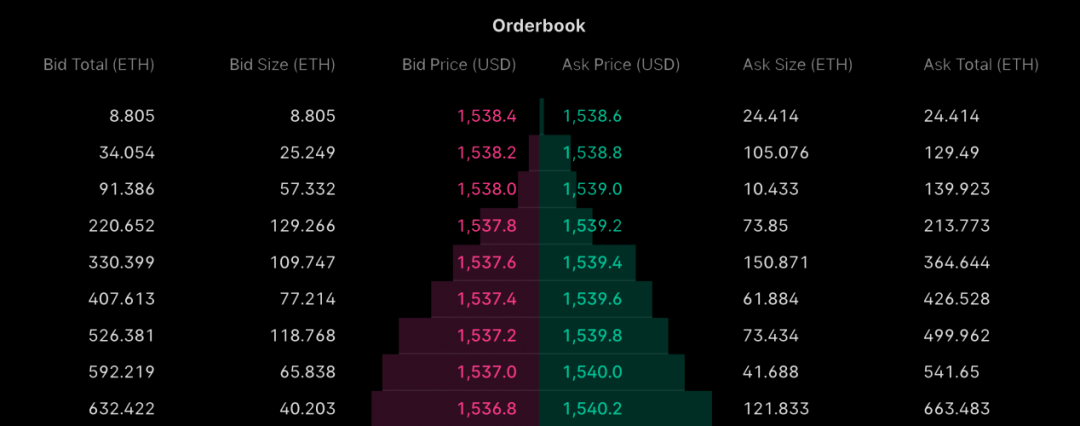
Due to the hidden order book, dark pools often become popular trading venues for large "whale" traders who transfer large assets without attracting attention from the entire market. The benefit of hiding the order book is simple microeconomic reasoning: if traders reveal too many details of their trading strategy, others can use that information to their advantage. For example, if a market maker sees a large sell order for an asset, the market will push the price down, resulting in a lower execution price for large volume traders.
In the cryptocurrency field, dark pools also offer similar advantages. By hiding the order book, traders can prevent other traders or bots from hedging or manipulating the market based on order information, thereby obtaining more favorable trading prices and execution results. Additionally, for institutional investors conducting large-scale trades, using dark pools can minimize market impact, reduce trading costs, and mitigate the impact of market volatility on trade outcomes, allowing for more efficient large-scale trading.
Dark Pools in the Crypto Industry
In decentralized cryptocurrency exchanges, the issue of public order book transparency is even more significant, especially for large-scale traders moving substantial orders. Currently, decentralized exchanges on the market not only leak the current state of the order book but also all possible states. Past states can be obtained through querying archival nodes, and the current state can be seen by any lightweight client or RPC node, and even estimated from viewing the memory pool. This makes it easy for traders' trading strategies and intentions to be analyzed and exploited by others.
This situation makes large-scale traders more inclined to execute orders in dark pools to protect their trading strategies and privacy. Dark pools conceal the details of the order book, preventing others from obtaining detailed information about the trades, thereby protecting the traders' interests. At the same time, dark pools can reduce market impact and trading costs, allowing large-scale traders to conduct bulk trades more effectively.

As other exchanges' states are always public, this exposes traders to more severe information leakage, ultimately resulting in less favorable execution prices:
Pre-trade Quote Fading: Similar to traditional finance, if a large non-market order is placed on the order book, all other traders can see the large buy or sell order, causing the order book to move away from the large trader's hands, exaggerating or depressing the price.
Atomic MEV (Miner Extractable Value): Block producers have the authority to arbitrarily reorder, insert, and review transactions, allowing miners to maximize profits by adjusting or inserting the order of unconfirmed transactions to take advantage of price changes.
Copy-Trading: Anyone can see the token balances of any wallet, making copy-trading particularly easy.
Counterparty Discrimination: Due to the visibility of past transactions for any wallet address, market makers can provide worse quotes (or even refuse to execute trades) for complex, potentially risky counterparties.
Statistical Arbitrage: With the visibility of each trader's identity, it becomes easier to identify statistical patterns of each trader's strategies and profitability. This is commonly used for strategies such as Time-Weighted Average Price (TWAP) trading, where large orders are spread out over a period of time.
Renegade uses multi-party computation (MPC) to determine order matching and settles matched orders using zero-knowledge proofs (ZKP), maintaining end-to-end privacy before and after on-chain processing.
2. MPC (Multi-Party Computation) Protocol
Multi-party computation (MPC) is a fundamental cryptographic primitive that has been under research since the early 1980s, but has rarely been used in the DeFi field before Renegade.
To better understand MPC, it is best to compare it with the "ideal functionality" that MPC achieves. In this setting, multiple mutually trusting evaluators send some private data. Once the evaluators receive all the private data, they compute on this data and send the computation results to all participants.
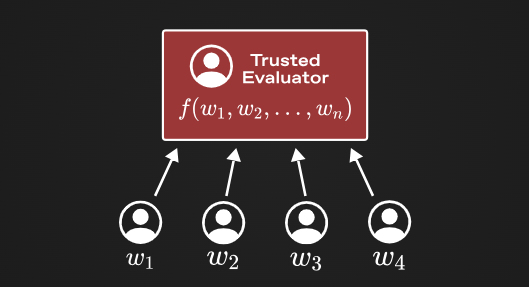
It is important to note that the evaluator only provides the result without revealing any information about the private inputs, and also does not retain any relevant data about the private inputs after the evaluation is completed. This allows the computation of a function without needing to disclose the inputs to everyone.
For example, two participants each hold two private numbers, and the evaluator can compute the relationship between these two private numbers, outputting a bit to indicate whose input is larger. This is the "ideal functionality" in multi-party secure computation.
The core idea of the MPC protocol is that it allows users to achieve the above functionality without needing to trust a central party. In other words, MPC allows multiple mutually untrusting participants to compute function outputs on secret input data.
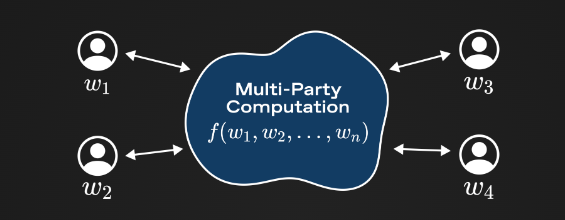
There are two main types of MPC algorithms: "garbled circuits" and "secret-sharing" algorithms. The secret-sharing method is usually easier to understand, performing "partially homomorphic" MPC computations on individual private inputs using Shamir's secret sharing. Understanding the workings of MPC at the protocol level goes beyond the scope of this document, but one relatively easy-to-understand secret-sharing MPC protocol is BGW.
Using MPC
In the context of dark pools, using MPC is natural: private inputs are the individual traders' personal order books, and the output of MPC is a list of any tokens exchanged after executing the order book matching engine.
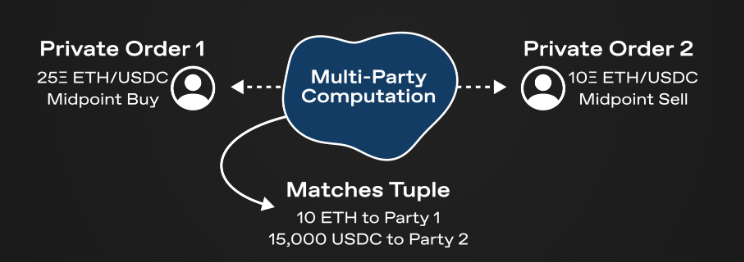
It is important to note that using MPC, two traders can anonymously match their orders. Traders never need to reveal their orders in plaintext, and if there is no match between the order books of two traders, no information is leaked (except for the fact that there are no valid counterpart orders).
However, the MPC algorithm itself does not provide any guarantees about the validity of each party's input. This would be a huge problem for dark pools, as Renegade must ensure that each trader actually has the appropriate balance for each of their orders. In the "MPC-ZKP Architecture" section, users will see how the idea of MPC is combined with zero-knowledge proofs to prove the consistency of balances and orders with on-chain states.
3. The MPC-ZKP Architecture (Multi-Party Computation - Zero-Knowledge Proof Architecture)
The core difference between Renegade and other exchanges (both centralized and decentralized) is that its state is locally maintained. Instead of being maintained by a centralized server (e.g., Binance) or distributed across thousands of distributed servers (e.g., Uniswap), all Renegade states are maintained by individual traders themselves.
Some terminology explanations:
Wallets are the order and balance lists of each trader. Each trader's wallet is private, and only the wallet hash (technically called "commitment and binding commitment") is published on-chain.
Relayers are nodes in the Renegade network. Each relayer is responsible for managing one or more wallets (meaning they can view unencrypted wallets) and for conducting multi-party computation (MPC) with other relayers.
Clusters (or "relayer clusters") are a group of relayers that logically manage the same wallets. Clusters are fault-tolerant groups of relayers that can achieve automatic failover and parallel multi-party computation.
As mentioned earlier, individual wallets are never publicly revealed. Traders publish the "commitment" of their wallets on-chain, where the wallet commitment is actually a combination of the wallet and some randomness. Knowing just a wallet's commitment does not reveal any information about the underlying wallet data to others.
Commit-Reveal Scheme:
When a trader wants to perform an operation on their wallet (deposit tokens, settle trades, etc.), they must know the old wallet and the new wallet, and send three pieces of information to the smart contract:
1) The commitment of the new wallet.
2) Two nullifiers of the old wallet, used to prevent double spending of the old wallet.
3) Zero-knowledge proof: that the commitment is correctly computed, the nullifiers are correctly computed, the old commitment exists in the global Merkle tree, and the change from the old wallet to the new wallet is valid (e.g., the user did not arbitrarily increase the balance).
The smart contract maintains a global Merkle tree of all previous commitments and a set of nullifiers used to reveal previous wallets.
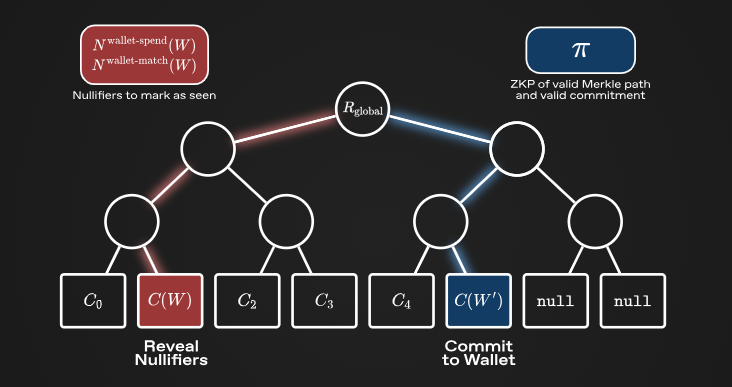
By using the commit-reveal scheme, Renegade can achieve complete wallet privacy (i.e., not revealing any information about the wallet on-chain), while maintaining full state consistency and preventing double spending attacks.
Network Architecture
Fundamentally, Renegade is composed of a p2p gossip network consisting of many independent relayers that continuously connect and perform multi-party secure computation as new orders enter the system. Relayers never custody assets and are only granted view access to wallets for peer-to-peer multi-party secure computation.
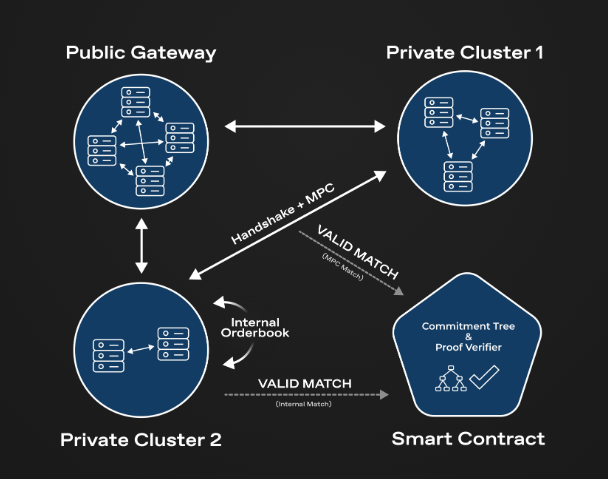
In the above diagram, there are three independent relayer clusters: Public Gateway, Private Cluster (1), and Private Cluster (2). The Public Gateway is a large cluster accessible to those who do not want to run their own nodes, but it is just like any other relayer cluster (i.e., no special privileges).
When a new order is input into a wallet managed by one of the clusters, the cluster will propagate a tuple (containing the order data commitment and a proof of order validity) containing the commitment to the order data and a proof of the order's validity using zero-knowledge proofs. All other relayers will monitor the new tuple, and if a new tuple is detected, they will contact the originating cluster and begin performing multi-party secure computation (MPC).
The MPC computation executes the matching engine. In other words, given two orders (held privately by different relayers), both parties will compute an MPC that implements the matching engine execution for these two orders. This achieves complete anonymity, as no information about the orders is revealed before the MPC. After the MPC, both parties will only know which tokens were exchanged; if there is no match between the orders, no other information is revealed.
It is important to note that the dark pool track is a way to protect trading information and participant privacy, where trading parties remain anonymous to each other, and order matching is achieved through secure multi-party computation.
Cooperative SNARK
As mentioned in the section on MPC, the multi-party secure computation protocol itself does not provide any guarantees about the validity of input data. To address this issue, the commitment of the order data is recalculated internally within the MPC. If the recalculated commitment does not match the publicly known commitment in the tuple, the output matching list will be zeroed to prevent fraudulent operations on the orders.
In addition to the input consistency issue, a simple application of MPC would lead to issues in atomic settlement. Specifically, Renegade must ensure that the output of the MPC cannot be publicly known before the trade matching is recorded on the blockchain. If any party can know the output of the MPC and interrupt the connection before the actual token exchange, the protocol would leak order information.
To address this atomic settlement issue, Renegade uses the cooperative SNARK framework proposed by Ozdemir and Boneh. By integrating zero-knowledge proof generation into the MPC algorithm, cooperative SNARK allows relayers to jointly prove a specific NP statement, namely VALID MATCH MPC. This statement essentially asserts that, given the publicly known order data commitment and the publicly known commitment of the matching tuple, both parties indeed know the valid input orders.
The dark pool track protects trading information and participant privacy by using cooperative SNARK (verifiable zero-knowledge proofs) and multi-party computation protocols to verify the validity of trades and achieve automated atomic exchange settlement without revealing real identities and trade details. In this mechanism, participants do not directly access each other's actual information, but use advanced cryptography to prove the validity of trades and ensure automatic execution of exchanges. Overall, the dark pool track builds a verifiable, privacy-protecting decentralized trading environment.
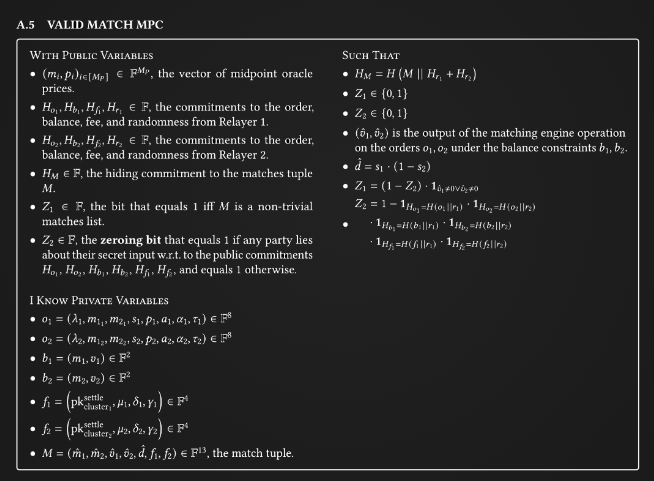
Once the cooperative proof of a valid matching MPC is computed, either party can submit it to the smart contract to actually exchange tokens. Unlike directly running the matching engine execution, the cooperative proof ensures that both parties are certain of the match (i.e., which tokens were exchanged) and the settlement (i.e., the actual token exchange) is atomic.
Therefore, by implementing this MPC-ZKP framework through cooperative SNARK, the project creates a decentralized exchange (DEX) based on atomic and completely private computation, both before and after the trade.
This describes the creation of a decentralized exchange (DEX) based on atomic and completely private computation using the MPC-ZKP framework through cooperative SNARK. This DEX ensures the atomicity of matching and settlement through cooperative proofs and protects the privacy of trades using zero-knowledge proofs.
4. Privacy Protection
In the introduction, it was mentioned that there are three types of issues in current decentralized exchanges: lack of pre-trade privacy, lack of post-trade privacy, and MEV (Miner Extractable Value) issues. By using MPC matching and zero-knowledge settlement as discussed earlier, Renegade addresses these three issues:
1) Pre-trade Privacy: Since wallets are locally maintained by relayers, the smart contract never sees any order or balance information. Additionally, trades are propagated using commitments to the orders, so no information about the orders is known in advance of the order matching.
2) Post-trade Privacy: In the on-chain state, there is only a global Merkle tree pointing to wallet commitments, so balances, orders, and trades are never publicly disclosed, even with a valid match. Even if counterparties know which tokens were exchanged, they cannot know the specific scale behind the match.
3) Minimization of MEV: Since the smart contract only checks zero-knowledge proofs, block producers or sequencers cannot insert or front-run trades.
In other words, Renegade provides the following privacy attributes:
Third parties (including sequencers) are completely unaware of the state of trades, except for the global token inflow and outflow and the total number of unfilled orders.
Counterparties can only know which tokens were exchanged in the case of a match, but cannot know any other information. If there is no match, counterparties can only know this fact.
Relayers managing wallets are aware of the contents of the wallets (balances, unfilled orders, etc.), but have no ability to tamper with the wallets.
Renegade addresses the lack of pre-trade privacy, lack of post-trade privacy, and MEV issues in current decentralized exchanges by using MPC matching and zero-knowledge settlement. This solution provides high privacy protection for third parties, counterparties, and relayers during the trading process.
5. Fees and Governance
All fees and governance parameters are subject to change before the mainnet launch.
- GAS Fees
The GAS fee for creating a new wallet is approximately $10, and the GAS fee for each deposit, withdrawal, and transfer operation is approximately $1. If a user runs their own relayer in super-relayer mode (see Super-Relayer), order placement and cancellation will be instant and will not incur GAS fees. If a user uses someone else's relayer or does not run in super-relayer mode, the GAS fee for placing or canceling orders is approximately $1.
- Protocol Fees
In addition to GAS fees (paid to Ethereum validators), Renegade charges a protocol fee of 2 basis points (0.02%) for each successful match. If a user runs their own relayer, this is the only fee they need to pay; if a user uses someone else's relayer, additional relayer fees are set by the relayer operator. Public relayers charge an additional 8 basis points fee per transaction, in addition to the 2 basis points protocol fee.
- Governance Power
Renegade is a protocol with minimal governance. All contracts are immutable since deployment, and only a "developer key" with the permission of any 2 out of 3 signatures can make necessary changes or upgrades when needed. It has the following permissions:
1) Enable a boolean flag to reject all valid matching proofs, thereby stopping matching within the exchange. While Renegade does not want this to happen, it can be used in the event of smart contract vulnerabilities or oracle manipulation attacks.
2) Enable a boolean flag to stop all deposits into the exchange. This permission will be used in the event of a vulnerability or when migrating the exchange to a new deployment.
3) Change the global protocol fee, with a cap of 2 basis points per transaction. The fee can be changed within the range of [0, 2] basis points, including completely disabling the fee.
4) Change the public key for sending protocol fees.
5) Delegate the above permissions to a new address, or completely change the address with permissions.
Additionally, the developer key has no authority to review withdrawals or transfers. Furthermore, four years after the contract deployment date, the developer key will lose all permissions and freeze all governance parameters.
3.4 Industry Space and Potential
3.4.1 Classification
- Privacy Track
The privacy track is mainly divided into four major sections: privacy computing network, privacy trading network, privacy applications, and privacy coins.
- Privacy Trading Protocols
The privacy trading network primarily focuses on the privacy processing of on-chain trading data (types and quantities of held or traded coins), supporting users to conduct private trades natively using technologies such as zero-knowledge proofs, without the need for tools like Tornado Cash, to ensure that their privacy data is not visible to outsiders, while also supporting the development of more types of privacy applications within the protocol.
- Privacy Computing Protocols
Privacy computing protocols mainly protect privacy in the generation, collection, storage, analysis, utilization, and destruction of data. In addition to common scenarios such as DeFi and NFT, they also plan to integrate deeply with the big data and AI industries.
Compared to other forms of privacy projects, privacy computing protocols are a more foundational infrastructure, where specific trade information (types and quantities of coins, etc.) can often be publicly viewed through a block explorer, but they emphasize the privacy of user data. Some major privacy technologies include zero-knowledge proofs, secure multi-party computation, cryptography-based learning, and trusted execution environments (TEE). Cryptography-based learning is a technology that allows parties to jointly train a machine learning model without revealing private data to each other.
- Privacy Applications
Privacy applications are applications built on top of Layer1 or Layer2 protocols, providing privacy protection features for users or DApps in different application scenarios, such as trading, payments, emails, etc.
- Privacy Coins

Privacy coins are cryptocurrencies that natively support privacy, preventing outsiders from viewing specific transaction details such as types and amounts. They typically do not support smart contracts and related applications, and related projects first emerged as early as 2014.
Currently, the development of privacy coins is generally average, with user and transaction volumes significantly lower than those of smart contract platforms, DeFi, and other projects.
Renegade belongs to the dark pool track within the privacy trading protocol category in the privacy track.
- Sub-track: Dark Pool Track
Dark pool trading is a common practice in network trading and has become an important topic of research in the global financial industry. In traditional stock markets in the United States and Europe, dark pool trading accounts for 10-30% of industry trading volume. The majority of dark pool trading occurs in the financial derivatives market, controlled by a few brokers such as JPMorgan, Goldman Sachs, Fidelity, Deutsche Bank, and Morgan Stanley, who hold a unique position and influence in the market.
Unlike the dominance of a single entity in the traditional US stock market, the dark pool market consists of multiple platforms with different characteristics. According to incomplete statistics, there were over 21 dark pool platforms in the US market over a decade ago. The operators of these dark pool platforms are mainly divided into three categories: brokers, exchanges, and hedge funds.
Dark pools operated by brokers can be divided into three types: dark pools that only trade external institutional orders, dark pools that trade external orders and operator orders, and consortium dark pools operated jointly by multiple brokers. There are some representative dark pools in the traditional investment industry, such as Instinet CBX, Goldman Sachs' Sigma X, and BIDS.
3.4.2 Market Size
- Privacy Track Market
According to data from Crypto Slate, as of August 25, 2023, the total market value of the privacy track is $17.78 billion, with a market share of 1.69%. The 24-hour trading volume is $252 million. Based on market value rankings, the top three privacy tokens are currently Monero (XMR), Zcash (ZEC), and Mina (MINA). These data reflect the current scale and trading situation of the privacy token market.
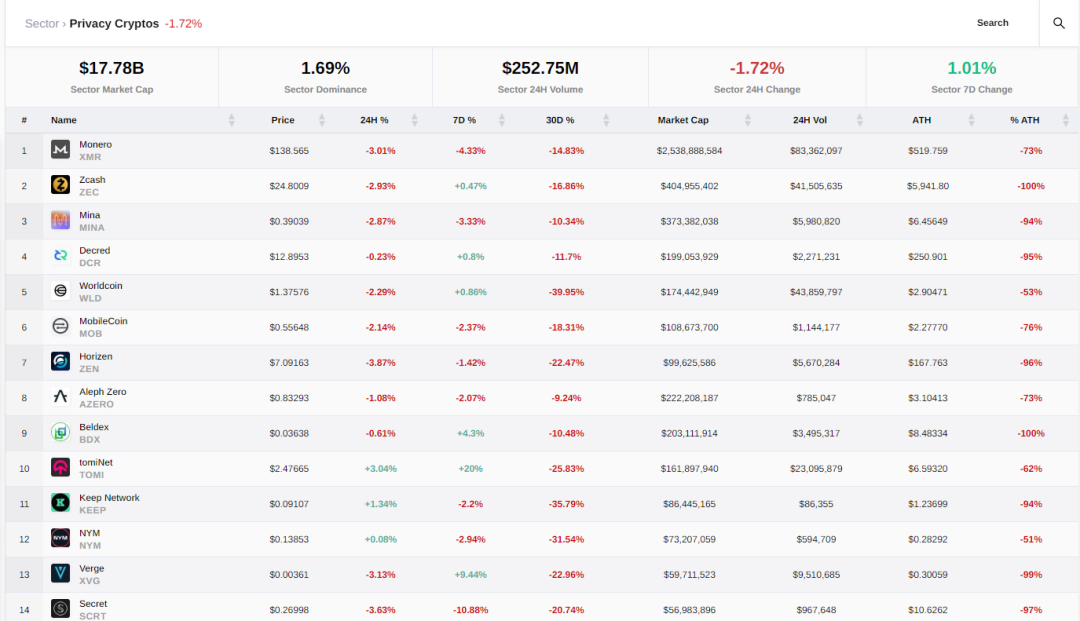
- Sub-track: Dark Pool Track Market
In the cryptocurrency field, with the increase in the number of large holders, the demand for large-scale transactions has also gradually increased. Large orders have a significant impact on the market and may even cause a market collapse. To reduce the impact on the market, large investors tend to choose over-the-counter trading, known as dark pool trading in the cryptocurrency field.
However, due to the limited number of institutions participating in the dark pool market and the relatively few new projects from 2021 to 2023, dark pool trading remains a relatively emerging field. Currently, there is limited statistical data on the participation of large institutions in dark pool trading. According to a report by Aite Group, over-the-counter trading accounted for 60% of all cryptocurrency trading in 2018, and this proportion increased to 65% in 2019. In comparison, this proportion was only 32% in 2016.
From 2020 to 2023, some new projects emerged in the dark pool trading field, such as BlackOcean and Ren. They raised $4.3 million and $3.4 million, respectively.
3.5 Business Data
l Social Media Data
- Twitter: 8,016 followers
- Discord: 2,006 members, with a daily active user count of approximately 249.
On Discord, while there is not much casual conversation, there is relatively more in-depth discussion about the project's whitepaper. This demonstrates the community's interest and active participation in gaining in-depth understanding of the project and related discussions.
l Technical Data:
According to data from GITHUB, the project's code commits began on July 3, 2022. Currently, the number of contributors involved in code commits has reached a maximum of 45 people, and the number of code commits has been maintained at around 5,000. Starting from October 2022, the number of code commits and contributors began to show an increasing trend. In July of this year, the highest number of code commits in one day reached 20,000. These data reflect the project's recent rapid development and demonstrate the community's active participation and contribution to the project.
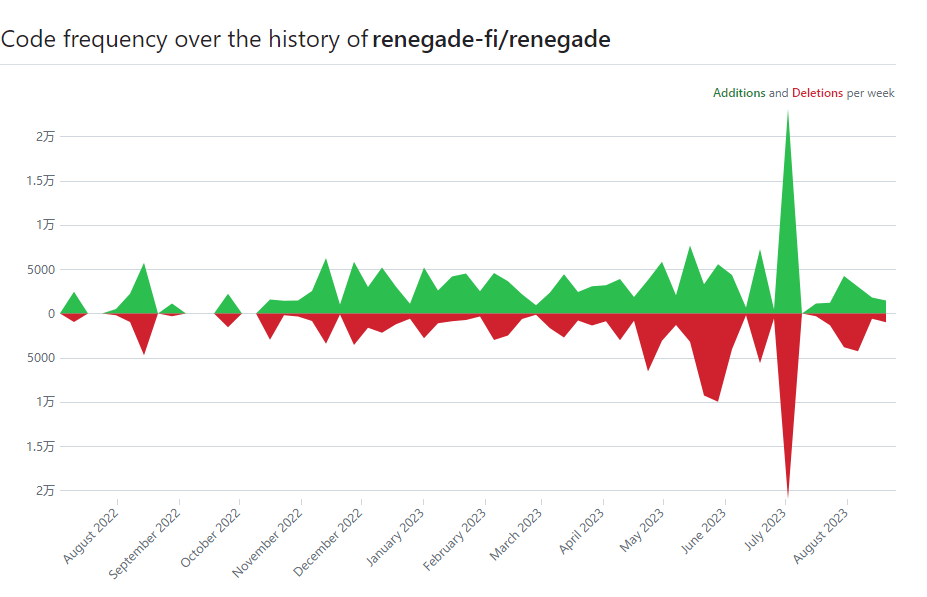
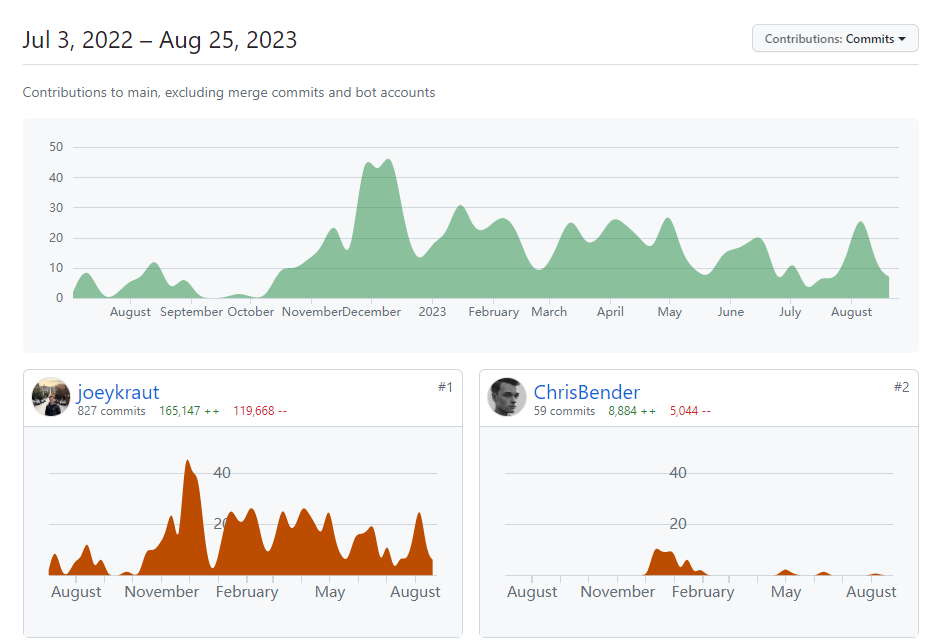
As the project's mainnet has not yet launched, other operational and protocol data for the project is currently unavailable.
3.6 Project Competitive Landscape
In the sub-track of the privacy track, the dark pool track, major projects emerged between 2018 and 2019. From 2010 to 2022, the total number of projects launched was relatively small and did not attract widespread attention. It was not until 2023 that the dark pool track once again became a focus of public attention. Previous projects, such as BlackOcean and dark pool sections of major exchanges, gradually lost market competitiveness. The two projects selected this time, the high-market-value and recently popular dark pool trading protocol REN and the recently launched mainnet project Enclave Spot.
3.6.1 Project Introductions
- Ren
Republic Protocol (REN) is a cryptocurrency designed to implement a protocol for distributed dark pool trading. It allows a large number of crypto assets (such as BTC, ETH, and ERC20 tokens) to be traded anonymously in a distributed network. Republic Protocol uses atomic swap technology to trade without exposing order details, matching orders through a multi-party computation protocol engine. This design protects the privacy of trades and provides convenience for traders. REN aims to provide a decentralized trading system for large trades, enabling trades between ERC20, Ethereum, and Bitcoin to occur with minimal price slippage. It adopts an open-source decentralized dark pool exchange protocol to hide trading details on the order book.
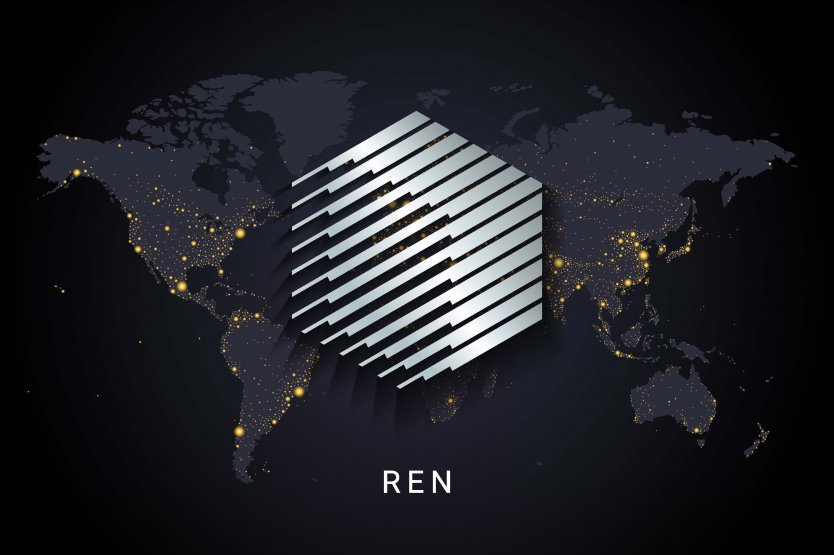
- Enclave
Enclave Markets is a fully encrypted exchange (FEX). The platform is built entirely within a secure enclave, preventing any party, including the exchange operator, from reading order activity and protecting assets through a mechanism that eliminates the possibility of a single point of failure. The first product, Enclave Cross, provides users with an institutional-grade, fully confidential intermediate matching platform, allowing participants to conduct block trades of digital assets at market prices without causing market impact.
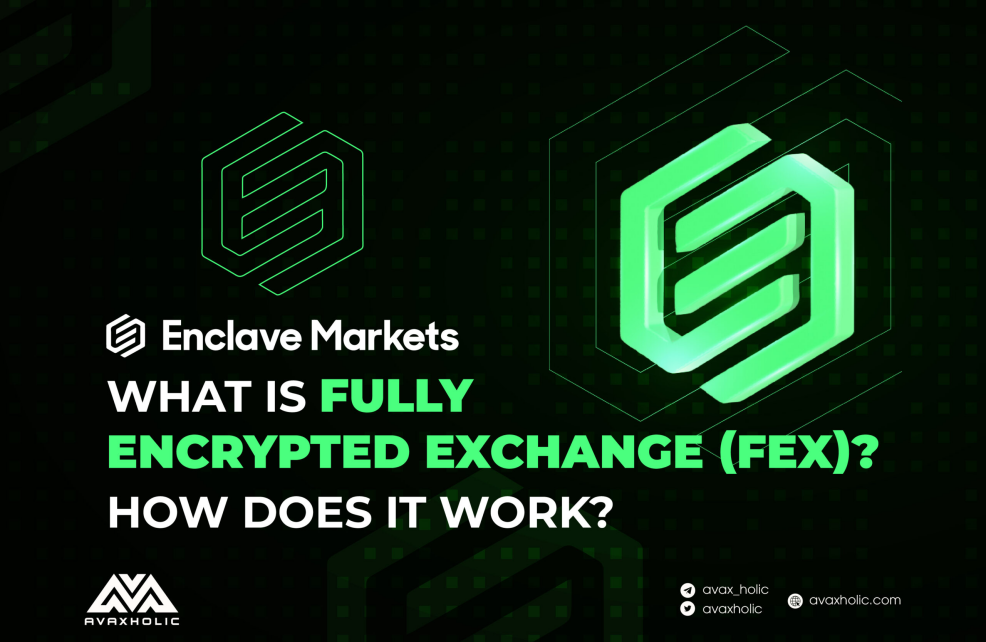
3.6.2 Project Comparison
- Republic Protocol (Ren)
The system relies on a carefully designed incentive system to ensure that players comply with the rules. RenEx "Dark Nodes" run the matching engine to ensure the operation of the dark pool, and the existence of multiple dark pools will mitigate the risk for counterparties. To prevent malicious attacks, network nodes (Darknodes) are required to stake 100,000 REN, the token of the Republic Protocol.
- Enclave
Enclave Markets uses secure enclave technology to provide hardware-based memory encryption. This means that critical trading software is encrypted within a walled-off code known as "Enclave." Enclave is protected by encryption and cannot be tampered with or leak data.
Any changes to the "Enclave" codebase will change its encrypted hash value, so no party can insert a hidden code update without approval from the authenticated parties.
This setup is a significant improvement over traditional exchange infrastructure, as it ensures that no one can control the exchange's codebase or customer funds without approval from the decentralized network of validators.
- Renegade
Throughout the entire lifecycle of a trade, Renegade maintains anonymity by using Commit-Reveal Schemes, multi-party computation (MPC), and zero-knowledge proofs for effective matching engine execution. This ensures that no third party, including block proposers, can access any user's token balances, pending orders, or trade history. This is because zero-knowledge proofs allow Renegade to prove the validity of trades without disclosing any information about the trades themselves. Once a match is found, token exchange settlement is conducted through zero-knowledge proofs to hide all trade information while maintaining system consistency. Apart from global token inflow and outflow, no third party that is neither an end user nor a managing relayer can obtain any information about pool activity.
3.7 Token Model Analysis: Total Token Supply and Distribution
The Renegade project has not yet disclosed related token information, and it is currently in the internal testnet stage.
4. Preliminary Valuation
4.1 Core Issues
Does the project have reliable competitive advantages? Where do these competitive advantages come from?
1) Privacy Protection: Renegade provides users with high transaction privacy protection by using multi-party computation (MPC) matching and zero-knowledge proof technology. The smart contract never sees any order or balance information, and transaction details are not publicly disclosed on-chain. This ability to protect privacy is an important competitive advantage of the Renegade project.
2) Transaction Efficiency: Renegade adopts MPC matching technology to move the transaction matching process off-chain. This technology significantly improves transaction speed and throughput, reduces user wait times for confirmation, and provides an efficient trading experience.
3) MEV Risk Reduction: Renegade minimizes the opportunity for miners to extract maximum extractable value (MEV) by only verifying zero-knowledge proofs and not inspecting the specific content of transactions. This design prevents miners from accessing sensitive information such as the order book and using this non-public information for arbitrage or manipulating the order of transactions for profit. Compared to directly processing transactions, only verifying zero-knowledge proofs without detailed information such as the order book prevents miners from leveraging this advantageous information for additional gains. This approach effectively mitigates the threat of MEV to decentralized exchanges and ensures fair trading. The ability to reduce MEV risk is one of Renegade's competitive advantages.
4) Usability and Decentralization: Renegade aims to provide a user-friendly trading experience while maintaining decentralization. Users can choose to use their own wallets and relayers or opt for others' relayers. This flexibility and user-friendliness give Renegade a competitive advantage in the decentralized exchange field.
5) Technological Innovation: The Renegade project adopts advanced technologies such as MPC matching and zero-knowledge proofs, which are innovative in the decentralized exchange field. By leveraging these innovative technologies, the Renegade project can provide a more secure, efficient, and private trading environment, giving it a competitive edge compared to traditional centralized exchanges.
What are the main variable factors in the operation of the project? Are these factors easy to quantify and measure?
1) User Count: The success of the project is closely related to the number of users it attracts. More users mean more trades, higher trading volume, and more fee revenue.
2) Trading Volume and Value: The operational status of the exchange is closely related to trading volume and value. These metrics can measure the platform's activity level, user participation, and project attractiveness.
3) Liquidity: Liquidity refers to the amount of funds available for trading on the exchange. Sufficient liquidity can attract more traders and market makers, providing a better trading experience.
4) Platform Fees: The operational revenue of the exchange mainly comes from trading fees. The amount of platform fees is closely related to trading volume and value.
These factors are typically quantifiable and measurable. For example, evaluating the operational status of the project can be done by analyzing data on user count, trading volume, and trading value. Similarly, tracking liquidity metrics and platform fee revenue can provide insights into the platform's development. These factors can be quantitatively measured through data analysis and monitoring to assess the project's operational performance and development trends.
4.2 Major Risks
Protocol Mechanism Risk: The Renegade project has a risk or shortcoming in that it does not directly consider the impact of capital costs and opportunity costs. In Renegade, users need to deposit funds before trading, which will impact the protocol with capital costs. Additionally, other costs such as transaction costs and hidden costs are not thoroughly discussed, which is also a shortcoming. Therefore, the project may not have fully assessed and addressed the comprehensive costs of the trading process, which could affect the interests and attractiveness of participants.
Protocol Mechanism Risk: In Renegade, batch auctions aggregate multiple trade orders for simultaneous execution. However, the lack of conclusive evidence supporting batch auctions is a shortcoming. While intermediate price trading largely meets the demand, the effectiveness of batch auctions has not been fully validated. This could lead to the project not providing a clear advantage or solution, resulting in a competitive disadvantage in the market.
Regulatory Risk: The risk in the dark pool trading track lies in the lack of public transparency and the potential for non-standard trading behavior. These issues may attract regulatory scrutiny, and regulatory pressure could become a ceiling for dark pool trading. Once regulatory authorities launch an investigation, it could lead to a series of penalties.
5. References
https://renegade.fi/ Renegade Official Website
https://twitter.com/renegade_fi Official Twitter
https://renegade.fi/whitepaper.pdf Whitepaper
https://substack.renegade.fi/p/renegade-raises-34m-from-dragonfly Financing Situation
https://www.linkedin.com/company/renegade-fi/people/ LinkedIn Company Information
https://renegadefi.typeform.com/access?typeform-source=substack.renegade.fi Whitelist Testnet
https://foresightnews.pro/article/detail/24055 Privacy Solutions on Public Chains
https://www.grenade.tw/blog/ama-enclave-markets-spot/ Enclave Spot AMA Review
https://cryptoslate.com/cryptos/privacy/ Cryptoslate
https://twitter.com/renprotocol REN Official Twitter
https://www.enclave.market/ ENCLAVE Official Website
https://www.mmjh.net/Bitcoin-shishenme/1036.html Dark Pool Track: The Secret Unknown
https://github.com/ Github
免责声明:本文章仅代表作者个人观点,不代表本平台的立场和观点。本文章仅供信息分享,不构成对任何人的任何投资建议。用户与作者之间的任何争议,与本平台无关。如网页中刊载的文章或图片涉及侵权,请提供相关的权利证明和身份证明发送邮件到support@aicoin.com,本平台相关工作人员将会进行核查。




